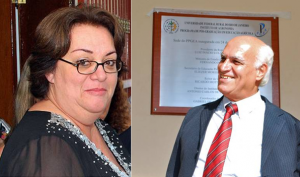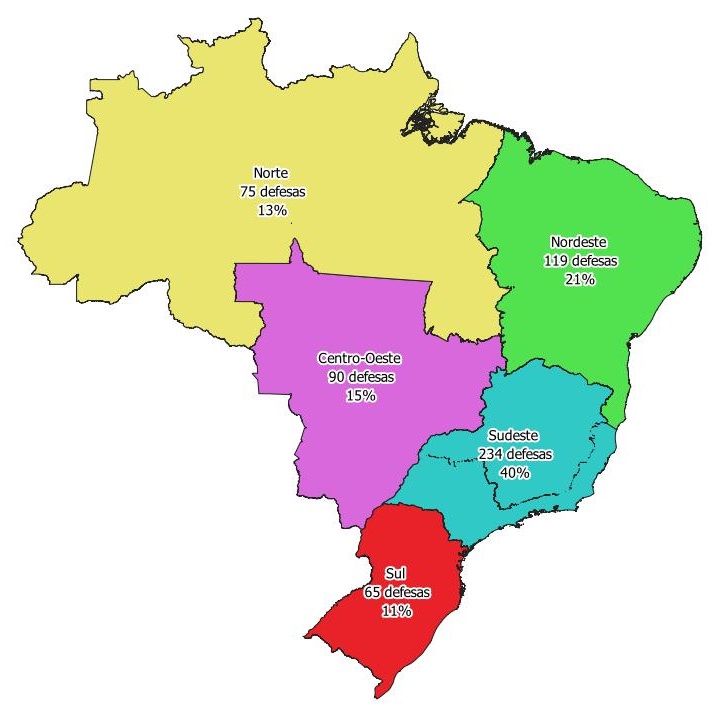History of PPGEA
Created on April 22, 2003, The Graduate Program in Agricultural Education (PPGEA) is an academic master’s degree within the educational area of the Coordination for the Improvement of Higher Education Personnel (CAPES). The PPGEA has graduated around 817 masters in education through the end of 2019.
Initially, The Graduate Program in Agricultural Education (PPGEA) was focused on promoting the development of an educational field, at the stricto sensu post-grad level, primarily represented by the Agricultural Sciences Degree programs offered mostly by Brazilian Federal Rural Universities, including the Universidade Federal Rural do Rio de Janeiro (UFRRJ).

Professors Sandra Sanchez (in memoriam) and Gabriel dos Anjos: Founders of PPPGEA/UFRuralRJ
The Agricultural Sciences Degree program at UFRRJ has been around for over forty years and has a long-standing tradition of training teachers, conducting educational research, and rural development, particularly in the agricultural field.
At the time that the Graduate Program in Agricultural Education (PPGEA) was created, graduates from these undergraduate programs worked at Federal Agrotechnical Schools scattered throughout the country. Based on studies and research conducted at the post-doctoral level, and with the partnership of professor-researchers from ENFA – École Nationale de Formation Agronomique (TOULOUSE-Fr), a group of professor researchers from UFRRJ in 2003 proposed the creation of the Master’s Program in Agricultural Education (PPGEA) in cooperation with CAPES. The program initially focused on educational professionals and managers from the Federal Agricultural Schools at that time.
The Program received immediate recognition from the Department of Professional and Technological Education of the Ministry of Education (SETEC-MEC), which began to contribute funding to make it viable and seeking to train its educational professionals from the Federal Agrotechnical and Technical Schools, CEFETS, and the Federal Institutes in the field of agricultural, technical and technological education.
Our Mission
The Graduate Program in Agricultural Education offers an ACADEMIC MASTERS DEGREE program, which has been certified and recommended by CAPES in the field of EDUCATION since 2003.
The Program promotes integration between various areas of knowledge from an interdisciplinary standpoint and deals with five subject areas: education and management; education and environment; teaching livestock production; teaching crop production and teaching agribusiness.
By adopting ALTERNATING LEARNING, the PPGEA has responded to the tremendous challenge of having educational actors from all regions of Brazil be better prepared academically, with a current emphasis on the Northern region, and posing research problems that take diverse socio-environmental and cultural realities into account. To accomplish these objectives, the program has received support from the Federal Professional and Technological Education System through Cooperation that provides sustainability to the Program. Candidates from the southeast region are included in annual vacancies of social demand.
All PPGEA initiatives are planned and implemented based on three assessment areas: INTERACTION, INCLUSION, AND PARTICIPATION, and its teaching staff is composed of post-graduate professors who possess considerable experience in their respective fields and currently occupy top-level management positions at the University.
Objective
Training researchers, teachers, managers, and administrative technicians to work directly in the field of agricultural education, represented primarily by the creation and expansion of the Professional and Technological Education System and by Rural Universities.
Specific Objectives
1. Encouraging research and producing results related to applying new meanings to the field of agricultural education within its interface with environmental, rural, and field education.
2. Devising problems and advancing research in response to territorial reconfigurations of educational public policies that have begun to recognize segments and sectors of the population that were previously excluded from educational processes.
3. Promoting discussions on a historical subject and a participant in sustained local and regional development, integrating the school environment into society.
4. Training teachers and educational professionals within a notion of teaching and research with interdisciplinary and transdisciplinary approaches.
5. Preparing educational social actors to work in a critical and creative manner to meet new educational demands, in interculturality and biodiversity contexts.
Research Lines
1. Teaching Methods in Agricultural Education: Technical Knowledge and Science Agricultural Education;
2. Agricultural Education, Environment and Society;
3. Teacher Training and Policies for Agricultural Education;
4. Cultural Identities and Collective Representations;
5. Teaching and Research Methodology for Agricultural Education.
Faculty
The PPGEA faculty consists of 31 full-time professors and 13 associate professors. The teaching staff complies with the accreditation parameters of CAPES.
The number of teachers and the diversity of their training is warranted considering the nature of the Program. There is an emphasis on interdisciplinarity in five areas of concentration in agricultural education, five lines of research, and handles an average of 60 new master’s degree slots allocated to new admissions at six-month periods.
On top of this, the Program has been available throughout the country and is aligned with the human resources training policies of the Federal government. Over the last four years (2017-2020), the program has heavily focused on the northern region of Brazil.
Nationwide Educational Training
The PPGEA is open to master’s students from all regions of Brazil. This program is integrated into professional areas with partner institutions. One of these partnerships is with the Institutions of the Federal Technical and Technological Education System in 38 Federal Institutes (FI), located on 499 campuses throughout Brazil.

Map of where graduates from PPGEA are working by Region in Brazil (2003 – 2019)
The FIs were created with extensive experience in the agricultural and livestock educational sector and are located in regions with distinctive preserved ecosystems, fauna, and floras. The unique locations of these FIs facilitate training for master’s students who want to learn about the Education and Management of Teaching Agriculture, Agribusiness, Environment and Education, Crops and Livestock Production.
 PPGEA Training Week in the Indigenous Community – Amazonas – IFAM Training Group – 2017-2
PPGEA Training Week in the Indigenous Community – Amazonas – IFAM Training Group – 2017-2
The capacity of the Program to conduct its activities on the campuses of Federal Institutes in which the physical structure is compatible with the areas of knowledge has brought the PPGEA a dimension of efficiency and resource management. This aspect goes well beyond the walls of the University, providing a dimension of visibility, real-life scenarios, and involvement that help in training master students.
As of 2011 in the various Regions, some of the work supported by the PPGEA in fulfilling its mission includes Mid-Western Brazil (IFMT), the North (IFAM, IFAC, IFRR, IFRO, IFTO, IFPA), and the Northeast (OPSI, UFRPE, IFBA). Along with continued training in the southeastern region of Brazil, notably at the IFF (Rio de Janeiro), IFES (Espírito Santo), and other training centers.
The PPGEA has played a prominent role in training managers from the Federal Institutes of Science and Technology in Brazil through its area of education and management of agricultural teaching. It interprets management concepts through debates and discussions based on a critical theory of education.
Another important aspect of the PPGEA’s programs is the training given to educators for basic, technical and technological education, which allows them to work in the Degree programs created at Federal Institutes that, by law, must guarantee at least 20% of the total slots in these courses. This aspect is of utmost importance for giving more recognition to teacher training in society, especially in regions that have limited educational programs in light of local specificities and demands for contextual and critical teaching.
Partnerships in the Training of Teachers and Technicians at Federal Institutes
With the enactment of Law 11.892 of December 29, 2008 – a regulation that instituted the Federal Professional, Scientific and Technological Educational System and created the Federal Institutes of Education, Science and Technology – the PPGEA broadened its efforts in an attempt to address the needs for providing training and academic refresher courses for the managers, teachers, and technicians at these institutions.
It should be pointed out that the Federal Institutes were created on equal footing with the Federal Universities, working in teaching, research and development in a vertical manner, assisting at various levels of education and methodologies, including higher education and Postgraduate programs.
In addition to this target audience, the PPGEA plays an important role in training staff members for the Brazilian Federal Universities, particularly UFRRJ and UFRPE.
Social demands – Qualifying Teachers from the Federal, State and Municipal Public Systems
There are also annual vacancies for Social Demand, especially CAPES Social Demand fellows, and graduates of IES undergraduate courses primarily in Rio de Janeiro. The PPGEA further strives to qualify teachers from the Federal Public System as a whole, including State and Municipal Systems.
Graduate Profile
PPGEA trains educators who can participate as agents of educational transformation at the local, regional and national levels through teaching, research, and continuing education, and by offering inclusive instructional practices that emphasize local culture and respect Brazil’s regional diversities.
The program’s methodology is structured under the perspective of Alternating Learning, an approach that is meant to promote intellectual training without detaching the subject from their base of activity or removing them from their territory. In this respect, the Program promotes curricular activities where there are periods interspersed with intensive academic activities conducted at UFRRJ, with classes on the course subjects and times when fieldwork is performed, allowing students to gain experiences and have their research supervised by the professors.
The on-site classes given every week at the PPGEA are full-time (40 hours) and include after-school instructional activities. The weeks for training take place at 30-45 day intervals at the headquarters of PPGEA/IA/UFRRJ, Seropédica campus, and/or at the activity centers in the Federal Institutes or associated partners.
Our graduates are educators who have taken on prominent leadership positions at educational institutions across Brazil. They work as educational professionals assigned to management positions, including Vice-Deans at Federal Institutes, Deans of Research and Development, Directors in the areas of research, teaching, and continuing education. PPGEA graduates have demonstrated an appreciation of critical and dialog-based education as a contributing factor in social transformation, and towards the improved well-being of people and a greater emphasis on culture, biodiversity, and interculturality in/of territories.
Data about the CAPES* Program
Name: AGRICULTURAL EDUCATION
Code: 31002013017P4
Coordinator: SANDRA REGINA GREGORIO
Basic Area: PROFESSIONAL EDUCATION (70807078)
Assessment Field: EDUCATION
Modality: ACADEMIC
Master’s program rating: 3
*data extracted from the Sucupira Platform on 12/2019